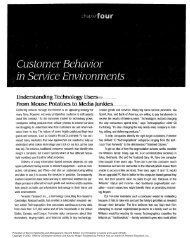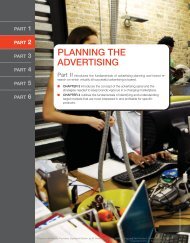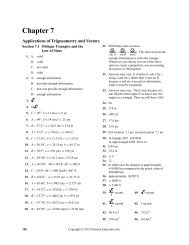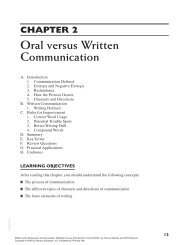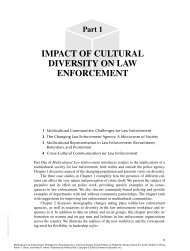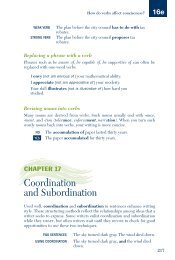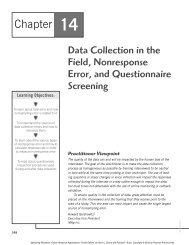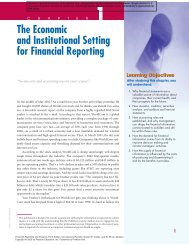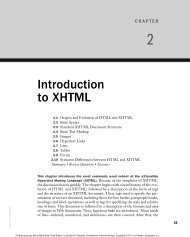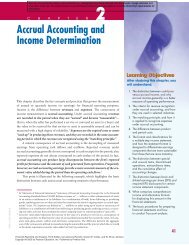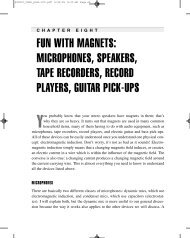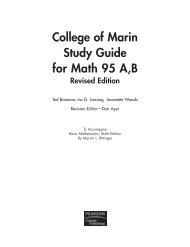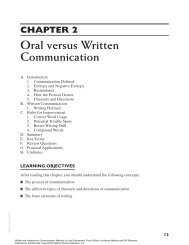writing the paragraphs in the first draft - Pearson Learning Solutions
writing the paragraphs in the first draft - Pearson Learning Solutions
writing the paragraphs in the first draft - Pearson Learning Solutions
Create successful ePaper yourself
Turn your PDF publications into a flip-book with our unique Google optimized e-Paper software.
Chapter 6 • Writ<strong>in</strong>g <strong>the</strong> Paragraphs <strong>in</strong> <strong>the</strong> First Draft<br />
81<br />
become even more lawless and destructive. Society cannot afford<br />
two such possibilities.<br />
Quotation<br />
The comic W. C. Fields is reputed to have said, “Anyone who<br />
hates children and dogs can’t be all bad.” Most people do not<br />
share Fields’s cynicism. View<strong>in</strong>g childhood as a time of purity,<br />
<strong>the</strong>y are alarmed at <strong>the</strong> way television exposes children to <strong>the</strong><br />
seamy side of life, stripp<strong>in</strong>g youngsters of <strong>the</strong>ir <strong>in</strong>nocence and<br />
giv<strong>in</strong>g <strong>the</strong>m a glib sophistication that is a poor substitute<br />
for wisdom.<br />
Statistic<br />
Granted, divorce may, <strong>in</strong> some cases, be <strong>the</strong> best th<strong>in</strong>g for<br />
families torn apart by parents battl<strong>in</strong>g one ano<strong>the</strong>r. However, <strong>in</strong><br />
longitud<strong>in</strong>al studies of children from divorced families, psychologist<br />
Judith Wallerste<strong>in</strong> found that only 10 percent of <strong>the</strong><br />
youngsters felt relief at <strong>the</strong>ir parents’ divorce; <strong>the</strong> rema<strong>in</strong><strong>in</strong>g 90<br />
percent felt devastated. Such statistics surely call <strong>in</strong>to question<br />
parents’ claims that <strong>the</strong>y are divorc<strong>in</strong>g for <strong>the</strong>ir children’s sake.<br />
Recommendation or Call for Action<br />
It is a mistake to leave parent<strong>in</strong>g to <strong>in</strong>st<strong>in</strong>ct. Instead, we<br />
should make parent<strong>in</strong>g skills a required course <strong>in</strong> schools. In<br />
addition, a nationwide hotl<strong>in</strong>e should be established to help<br />
parents deal with crises. Such tra<strong>in</strong><strong>in</strong>g and cont<strong>in</strong>u<strong>in</strong>g support<br />
would help adults deal more effectively with many of <strong>the</strong> problems<br />
<strong>the</strong>y face as parents.<br />
Write <strong>the</strong> Title<br />
Some writers say that <strong>the</strong>y often beg<strong>in</strong> a piece with only a title <strong>in</strong> m<strong>in</strong>d. But for<br />
most, <strong>writ<strong>in</strong>g</strong> <strong>the</strong> title is <strong>the</strong> f<strong>in</strong>ish<strong>in</strong>g touch. Although creat<strong>in</strong>g a title is usually<br />
one of <strong>the</strong> last steps <strong>in</strong> <strong>writ<strong>in</strong>g</strong> an essay, it shouldn’t be done haphazardly. It may<br />
take time to write an effective title—one that h<strong>in</strong>ts at <strong>the</strong> essay’s <strong>the</strong>sis and snares<br />
<strong>the</strong> reader’s <strong>in</strong>terest.<br />
Good titles may make use of <strong>the</strong> follow<strong>in</strong>g techniques: repetition of sounds (“The<br />
Plot Aga<strong>in</strong>st People”), humor (“Neat People Versus Sloppy People”), and questions<br />
(“Am I Blue?”). More often, though, titles are straightforward phrases derived<br />
from <strong>the</strong> essay’s subject or <strong>the</strong>sis: “Shoot<strong>in</strong>g an Elephant” and “Why Computers<br />
Don’t Belong <strong>in</strong> <strong>the</strong> Classroom,” for example.



